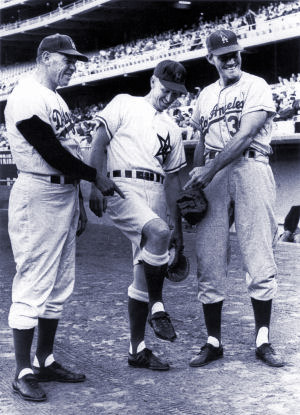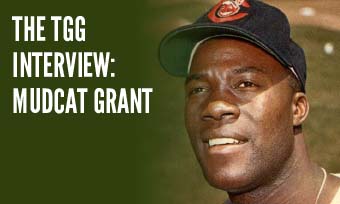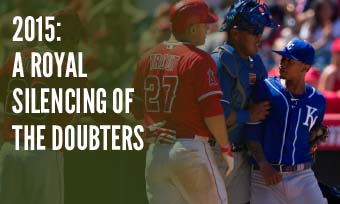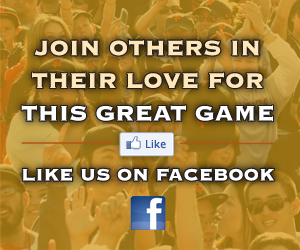The TGG Interview
Chuck Stevens
“Everybody was taken by Satchel and his reputation was awesome. When I got that hit against him, I was never terribly impressed by it, but the people thought that was a great accomplishment. To me, it was just, he was just another pitcher.”

Chuck Stevens shows off the shorts worn by the PCL’s Hollywood Stars while surrounded by two other Chucks: Chuck Dressen (left) and TV star Chuck Connors during Old-Timers’ Day at Dodger Stadium in 1962.
Chuck Stevens spent 20 years playing, coaching and managing professional baseball, much of it in the Pacific Coast League—but he is best remembered as the player who delivered the first major league hit off pitching legend Satchel Paige. He is the President of the Professional Baseball Players’ Association, a group that helps former professional baseball players in need.
With the St. Louis Browns, Stevens appeared in four games and went 2-for-13 (.154) with two runs and two RBIs before entering World War II. He rejoined the Browns after being discharged before the 1946 season, appearing in 122 games while hitting .248 with three home runs. As always, his defense and baserunning were generally top-tier but his lack of power kept him from a longer career in the majors. In 1947 he was outrighted to Toledo, where he batted .279 in 141 games.
He returned to the Browns in 1948, just in time to take part in a bit of baseball history on July 9 at Cleveland Stadium. With the Browns beating the Cleveland Indians 4–1 in the bottom of the fourth inning, Cleveland manager Lou Boudreau pulled his starting pitcher, Bob Lemon, replacing him with the 41-year-old rookie Satchel Paige to start the fifth inning. It was Paige’s first game in the major leagues, and the first batter he faced was Stevens, who had faced Paige many times in exhibition matches in California, and remembered hitting him pretty well. In this instance, he spoiled the story by lining a single to left field on the second pitch he saw. Nevertheless, Paige retired the next three hitters to get out of the inning unscathed.
During his third stint with the Browns, Stevens hit for a .260 average in 85 games, and was sold to the Hollywood Stars (PCL), hitting .321 over 38 games at the tail end of the 1948 season. For the next decade, Stevens played for several PCL teams, finishing his career as a player in 1957 with the Sacramento Solons.
After his retirement, Stevens got deeply involved in Professional Baseball Players’ Association. The Chuck Stevens Award is presented to the Southern California resident who had the most outstanding season in the minor leagues. Previous award winners include Keith Ginter, Sean Burroughs, Jeremy Reed, Jerry Owens, Jason Hirsh, Ryan Madson, Tommy Hanson, Evan Longoria and Freddie Freeman.
As told to Ed Attanasio, This Great Game
On Bill Veeck and Eddie Gaedel:
“Oh yeah, that was a dark cloud when Veeck did that. Many people said he turned into a circus. You know you don’t do things like that under normal circumstances, but it ends up giving the game a bad name. It’s like when Ted Turner, who’s a good guy, got a hold of the Braves and tried to manage them. What the hell do they think is going on? They don’t realize that it’s fairly serious between those lines. Well, you get all kinds. For lack of a better word, they were colorful and they were kind of good for the game, but only in their location. They didn’t have to take all of this crap national. That’s my feeling. But, you know, Bill Veeck was a good guy and he helped some ballplayers and that’s the plus factor. Some of the people then and now were in it for the big dollar and, well, things have changed. When us old guys get together, the first thing that’s said is “Well, the game has passed us by.” And then the next guy will say “Yes, and so has society” (laughs). But it was a great run. I really enjoyed every minute of it!”
On his Marriage of 70 Years:
“We just celebrated our 70th anniversary. And I’ve known her since she was in the fourth grade. I can honestly say that it’s been ideal, it seems like yesterday. We’ve never raised our voices to each other. We’ve never quarreled. My wife always says we pout but we don’t fight. And well, she’s just a delightful person to be around. Was as a kid, is as an adult. She was a great mother and we had one child; a daughter that was born while I was overseas. She was 4 1/2 months old before I saw her. So that’s our story. And, as I say, we kind of might be of interest to you, when I was playing for the Hollywood Stars—you know it was the only crap game in town west of the Rockies back then—so everybody up there knew me and we knew everybody up there and what they did.
So for our anniversary, we’ve done a zillion cruises and stuff like that so we didn’t want to do any of that. Our daughter and son-in-law and number 3 grandson, who’s Mel Gibson’s assistant, arranged for us to go to the Polo Lounge in the Beverly Hotel and then we had dinner at Mouso & Frank Grill, an old, old restaurant in Hollywood where I used to go all the time when I was playing so that was really fun. There’s nothing that can compare to that, I believe. But she was very supportive of my baseball career and was a good fan and I can honestly say I never brought a ballgame home. You know, she had the privilege of sitting there watching me make an ass out of myself a few times and it was part of the game.”
On Living the Hollywood Life, and Life on the Ranch:
“When I was playing for the Stars, I eventually became good friends with Jimmy Stewart and a fella by the name of Ronald Reagan. I made a picture with Reagan, worked as a contract player. I was not much of an actor and all of the prop guys and everybody assured me that my evaluation of my acting ability was totally accurate. I studied percussions for twelve years. My father was a fiddle player and they’re all on my father’s side, they were all ranchers in northern New Mexico.
My grandfather pioneered northern New Mexico. When he was a young, young, guy one of his friends was Pat Garrett. It goes back with a lot of history and he was originally from Missouri and I think he was 13 or 14 years old when he hit northern New Mexico and went to work for a general store, one thing or another, down there around Las Vegas kinda in the Union County and that’s where he met Garrett and people like that. He ended up managing the JT Cattle Ranch for a titled Englishman; at that time it was very fashionable for the titled young guys from England who got into trouble in England with gambling or a broad or something like that. And the family would send them over into western America and buy him a ranch to keep him out of sight for a while. And the fella that hired my grandfather running the ranch was called back to England and my grandfather bought the JT Cattle Ranch from him. And that’s the ranch I grew up on. My father was a cowboy just like his brothers, and good ones.”
On his Famous Hit Against Satchel Paige:
“Everybody was taken by Satchel and his reputation was awesome. When I got that hit against him, I was never terribly impressed by it, but the people thought that was a great accomplishment. To me, it was just, he was just another pitcher. I didn’t give it any thought then and I don’t now. You know, what the heck. The press made a big deal about it, as they always do. The attention was absolutely ridiculous but I guess somebody had to do it and so I was the one.”
On the Founding of the Professional Baseball Players’ Association:
“Yeah, we established it right here in Los Angeles. And their thought at the time was that everybody in baseball voluntarily contributes a minimal amount of money a year, so we can use that money to help former players, umpires or scouts–whatever. We help them for various reasons, if they’ve had a tough time getting along, so that there’s money available to help them through the rough times. And one of the things etched in stone was that you never divulged who you helped or how much. So, we helped Hall of Famers and we helped D-ball players. Didn’t make any difference. And if you were a Hall of Famer, you didn’t get any more preferential treatment than a kid 20 minutes in the minors. Everybody was an equal. And that still goes. It hasn’t changed a bit.”
On Barnstorming in Japan:
“In 1951, while I was playing for the Hollywood Stars, I got a phone call from Lefty O’Doul in San Francisco and he asked me, would I like to go to Japan with an all-star team that was going over there? And I jumped at the chance. We were salaried and oh it was a marvelous ballclub we had on that trip. We had the DiMaggios, both of ‘em; Dom and Joe and Billy Martin, Yogi Berra, Bobby Shantz, I think, Mel Parnell and Ferris Fain, I remember. They called us the O’Doul’s All-Stars and one game we lost to their all-star squad. It was the first time an American professional team lost to a Japanese professional team, if I’m correct. It was a good ballclub. So, we barnstormed in Japan for 30 days and it was a marvelous experience.”
On the Best Players he Ever Saw:
“Joe DiMaggio and nobody even close. Ted Williams was the most consistent hitter I ever saw, but Joe could field and Joe could run and Joe could hit. He’s the best. Williams and Stan Musial are the two best hitters that I ever saw. The guy that had the best year I ever saw was the year that Lou Boudreau had when he managed Cleveland. That would be ’48. He had…everything he did was right that year and he had a great pitching staff. How would you like to get off the train in Cleveland starting a three-game series and they got Feller, Lemon, Early Wynn, maybe Allie Reynolds—you know, not a soft touch in the bunch of ‘em!”
On the Pitchers he Feared:
“Uh, with my batting, lifetime batting average, they scared just about all of them (laughs). The guy that was the toughest for me was a guy that pitched for the Yankees named Spud Chandler. I don’t know, he just…the ball was moving. Bob Lemon was tough, but I had some decent luck against Bob Feller. I didn’t get to see Charlie Ruffing in his prime. He was kind of phasing out when I saw him, but he was a marvelous pitcher. And, uh, there were a lot of them. But those guys stood out in my mind as outstanding. Feller had the best curve ball I ever saw. And that’s what I always waited for and tried to hit. Because his fast ball was just…the ball was just up and moving and I was not a good high-ball, high fastball hitter, so I had to wait for the breaking stuff.”
On Rivalries in the Pacific Coast League:
“I don’t know if you are aware of it or not, but the Angels and the Hollywood Stars was a great rivalry. They called it a crosstown rivalry. As a Stars player, I would rather beat the Angels than eat and they felt the same way. And, we got into a big fight in Hollywood on a Sunday afternoon. There were guys going at it all over the field. They quieted that down and be darned if they didn’t start up again as a second fight. And they called the riot squad! The L.A. Police riot squad came out. And I was kind of a half-assed captain of the ball club and the first game ended and I walked into the clubhouse and there was a guy standing there in street clothes and I told the equipment manager to get his butt out of there, he had no business being in the clubhouse because I knew everybody was upset. And the guy walked over to me and said, ‘Mr. Stevens, I’m so-and-so, Captain of the L.A. Police Department, you people are now under our command.’ And I said, ‘What the hell does that mean?’ And he said, for the second game the starting players would be allowed on the bench, but everybody on both teams, the reserves will stay in the clubhouse. That’s the best fight. Another time, Gene Mauch and I got into it in San Francisco. Had a pretty good one there for awhile. It was all part of the game. You didn’t take too many prisoners.”
On Stealing Signs:
“It happened sure, but not regularly. Maybe occasionally. You’d see a catcher getting a little careless and you could pick up some things there, but I never got involved in anything like that on any of my ball clubs. A lot of hitters liked to get the signs. When I was on second base and somebody at the plate was a guy that liked to know, I had to sign to him ‘cuz I could see the catcher. I didn’t want that ‘cuz that was, you know, I would walk to the plate and was only gonna hit what I was looking at. I didn’t want any second guessing because if I’m looking for a curve ball and here comes that fast ball right out of my right ear. So that’s the reason I didn’t want them.
I’ve been reading now that Bobby Thomson got the sign before he hit the winning home run in 1951. But I say no way. I think, again, that’s just the press. I know Branca. I stayed in touch with him for years and Bobby Thomson was a guy I stayed in touch with for years. Because of my job (with the Professional Baseball Players’ Association), I can walk into any clubhouse in America anytime. So that’s how I knew them and then I was the guy that furnished all of the world class ballplayers for that Cracker Jack Series. That was American League against the National League and out of the 50 people that we invited, probably 35 of ‘em maybe 40 of ‘em, maybe a little exaggeration, were Hall of Famers. So these guys were all friends of mine.”
On his Dedication to the Fans:
“I’m talking about my era now; I don’t know about today, I’m certainly not speaking for them. We were bigger fans than you guys were. Fans of the game. Terribly obligated to the people who bought tickets to come to the ballgame. And we couldn’t do enough for them to show our appreciation. Again, I’m only talking about my generation, because I don’t know what their attitude today is…I do know but I’m not gonna make it public. So, anyway, that’s the difference.
They call the era that I was privileged to have played in the golden years. And I’ve repeated it two or three times to you and I believe that. I really do. In many, many ways it was a golden era. It’s when the ballplayers were a different breed and when they finally got control over their destiny with the Major League Players Association, that kind of thing. And I was there, a part of it, the team when that started. I sat in on the meetings. Each ballclub had a meeting to discuss would you like to see happen and would submit it to the Commissioner’s office. And little by little, it was implemented. We’re talking about minimum salaries and talking about Jacuzzis, you know what that is and each and every clubhouse and if you were on the road and pulled a muscle or something, generally, you’d have to ask permission to go over and get into the opposition’s Jacuzzi ‘cuz there wasn’t one in the visiting clubhouse. Little stupid things like that. So, I was around when that atmosphere changed. And changed for the better, when I say better, better for the ballplayer. And I think the fans appreciated their attitudes. I think it rubbed off all the way around. And then, the scenario kinda changed when the television thing become involved. It became a very impersonal thing.”
On Learning the Game in a Baseball Camp:
“The Browns sent me to a baseball camp. These camps were created by Branch Rickey, and I mean, he’s the guy that conceived the idea, as repulsive as it was. If you went to one of these Branch Rickey’s camps, your name wasn’t Stevens, it was number 35, or whatever happened to be the number that was pinned on your uniform. So there was, you know, no dignity there at all and it was miserable. So I went to the camp and then from that camp, the organizational managers chose which players they wanted for their club. And that’s how the club, in the Browns organization, was formed. That would be from Triple-A down to, at that time, to a D league. So, now, the kids out of high school, you know, they’ve go so much money invested in them, they start them too high, in my estimation, and the kids have to learn their business. And to learn their business, the organizations they’re identified with, hire all of these instructors. When we were in the low minors, you had a manager. Period, end of sentence. Now they’ve got a manager, and a pitching coach, and a hitting coach and a roving catching instructor, you know, all of that kind of thing, because they’re trying to teach these kids all of the things that we had been taught in high school. You know, we were much much more advanced as far as fundamentals then they are now, and I would argue that with anybody. I’m not being critical, I’m just stating facts. You know, I was there, and I was in baseball for 62 years, so I saw the evolution. And revolution. Because after the war, the players then formed what now is the union, and things changed drastically.”







